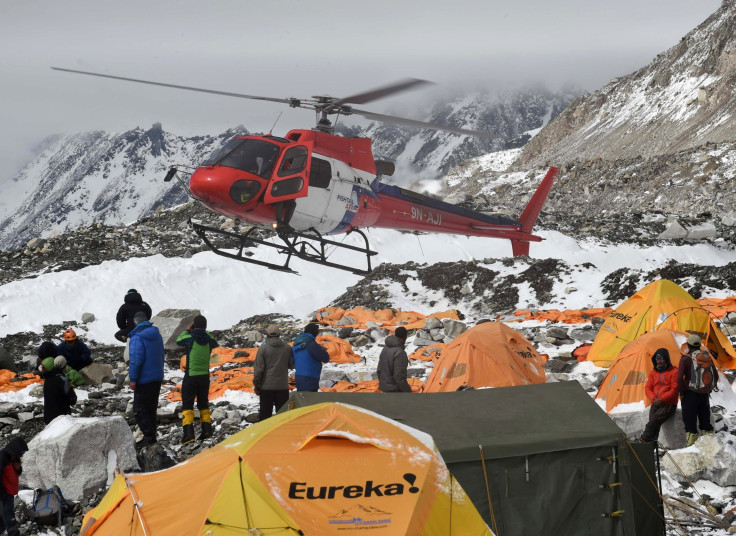Nepal Mount Everest Update: Helicopters Rescue Stranded Climbers As Others Share Supplies, Make Plans After Earthquake

Saturday's earthquake and subsequent avalanches in Nepal have created the worst disaster in Mount Everest's history. At least 17 people died and 61 were injured on the mountain. As rescuers used helicopters to evacuate survivors from Everest before their supplies ran out, climbers used social media to update their followers about the scene on the world's highest mountain.
Big mess of tents and equipment in EBC. pic.twitter.com/jiBN37tRR7
- Jelle Veyt (@cycling2himalay) April 26, 2015Some teams have already left the place, their camps being completely distroyed. Some people are even sleeping with helmets and boots on.
— Alex Gavan (@AlexGAVAN) April 26, 2015More than 40 teams of climbers were making their way up the mountain Saturday when the 7.8-magnitude earthquake hit, a representative from Nepal's tourism ministry told BBC News. It trapped about 210 people at two camps, both around 21,000 feet. Other climbers could still be stuck at the other two camps on the mountain.
American mountain guide Adrian Ballinger tweeted the China Tibet Mountaineering Association, which distributes permits to climbers, requested everyone return to Everest's base camps until the aftershocks stop. There, they shared food and drink and planned how to reach the ground. "[Our teams] don't have a lot of supplies because their camp at Base Camp was badly damaged, but they are being accommodated by other teams," Adventure Consultants manager Steve Moffat said. "Teams that weren't affected at Base Camp -- those that were not directly hit -- they have cooking facilities, they have food and fuel."
As of Monday morning, about 150 people remained stranded on Everest, CBS News reported. Snow, ice and rock prevented them from climbing down, and many of them lost their supplies in the avalanche. Helicopters were bringing people down two at a time because of the high altitude, but they were at the mercy of the fickle weather.
"The teams that have tried to make their way through the icefall today [Monday] were unsuccessful, and it will not be attempted again in the future. So at this point our only option to get down is by helicopter evacuation," American climber Garrett Madison told ABC News.
Helicopters started to evacuate people from camp 1and 2 to base camp all morning. Hoping for more clear weather! pic.twitter.com/7ygJiMIO7j
— Jelle Veyt (@cycling2himalay) April 27, 2015Helicopters flew to #Everest C1 today, rescuing stranded climbers & Sherpas. @ 1:30pm, clouds & No more helis. Hope for tomorrow.
— Daniel Mazur (@danielmazur) April 27, 2015Around 15 climbers still to be heli evacuated tomorow,weather permitting,from camp 1. Everybody else down to base camp.Huge credit 4 pilots.
— Alex Gavan (@AlexGAVAN) April 27, 2015Some climbers who had safely reached Base Camp were trying to decide whether they should keep climbing Everest. "We are still sorting through a lot of emotions; 24 hours ago we were wrapping people's body parts in bags," Canadian climber Nick Cienski told Reuters. "So on the one hand the reality of that ... and on the second hand, we are climbers and this is sort of what we do. And so, does it make sense to continue?"
Others, both in camp and on the ground, were banding together to figure out how to aid Nepal, which collects about $3.3 million in climbing fees each year and is seen as a tourist destination for many trekkers. "The time is not for climbing now, but for helping Nepali people," Romanian climber Alex Gavan tweeted.
High level official from China in North Side #Everest BC to discuss options for season and China response.#earthquake pic.twitter.com/ak20XEBAdZ
- Adrian Ballinger (@alpenglowexp) April 27, 2015The whole team is off the mountain, no help is needed in base camp anymore. I cancel my expedition and head to KTM. Help is needed there!
— Jelle Veyt (@cycling2himalay) April 27, 2015© Copyright IBTimes 2024. All rights reserved.





















